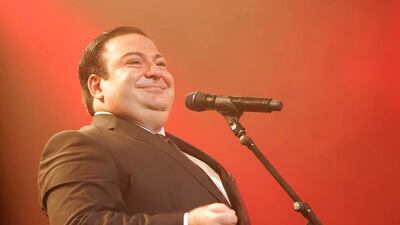A Badr Rami performance is akin to going to a museum. With his emotive vocal virtuosity as a guide, we are led from the streets of Aleppo and the courtyards of Andalusia to the concert halls of Egypt and Lebanon.
As one of the leading performers of qudud halabiya (Syrian folk songs that originated in Aleppo) and mouwachahates (a form similar to terza rima in which songs are composed of three-line stanzas), a typical Rami performance has songs dating back a thousand years.
His closest concession to the modern world is tracks that are about 50 years old, by the likes of Egyptian crooner Abdel Halim Hafez and Lebanese singer Fairuz. And that is the way the 31-year-old likes it.
“There are so many riches back in time that I have discovered, and those I am yet to discover – I feel like I haven’t even scratched the surface yet,” he says when we talked at the recently concluded Mawazine Festival in Morocco.
“To me, it all feels like an adventure, and I keep encountering new things and admiring how rich and deep our Arab artistic heritage is.”
What made you dedicate your career to singing such old musical forms?
It first came down from my surroundings. I was born in Casablanca to a family who loves art, music, heritage and culture. My father is originally from Aleppo, Syria, which we used to visit before the war. He is a violinist, and also has a masters degree in law. He graduated as a lawyer, but also had a music orientation. I did the same thing, and studied music, as well as business management.
That mix of art and academic rigour can also be found in the songs you perform. They are not pop ditties – some of the pieces you sing are epic in length and can go for up to 15 minutes, with lyrics that are deep, classical Arabic.
Absolutely. These songs are not easy and it required its own form of education. This is why I credit my father for instilling that love of education. Growing up in this atmosphere has helped me turn to singing. This is not stressed enough in today’s age: if you want a career as a musician, then studying music is very important. Talent is just the key to get you noticed, but a true artist needs to educate and develop himself. Nobody reaches the top without hard work, experience and patience.
Your musical education was not straightforward. You spent time at the Conservatory of Casablanca where you studied the lute and violin, but as a singer you really came into your own under the personal tutelage of the great Syrian singer Sabah Fakhri. What was it like working with him?
I learnt a lot from him – how he worked and his character. He is a pillar of the Arabic song. I am also lucky, as he is a friend of the family. He was in Casablanca at the time of my birth and made the call to prayer in my ear when I was born.
Your performances are engrossing experiences. Watching the audience, I was struck by their varied reactions. Some people were captivated by the sheer musicality, while in others I sensed a sadness or feeling of nostalgia. Is that a normal occurrence at your gigs?
I am glad you saw that, as these are some of the reactions we get from the shows. Arabs are kind, creative and sensitive people who love music. Consequently, qudud halabiya and Al Muwashahat Al Andalusia talk about love and authenticity, as well as our civilisation and authentic Arab culture. We feel these emotions deeply and you see that in the audience every night.
Do you feel that since the onset of the Syrian civil war your performances have taken on an extra emotional resonance, in that you are reminding us of better times?
I hear what you are saying but we should not wait for people to fall to remember them. We should always remember to be connected and help each other. Al Muwashahat, qudud halabiya and any authentic Arab songs – from Abdel Halim Hafez to Fairuz – are our heritage and should always be present, not just because our countries are bleeding. We cannot let them fall into oblivion. We have nothing other than our civilisation and heritage. I am proud to be a bearer of this heritage and hope I will be up to the par.
• Badr Rami will perform at the Royal Opera House Muscat on April 7 next year as part of the venue’s new season of performances. For more information, visit www.rohmuscat.org.om
sasaeed@thenational.ae


